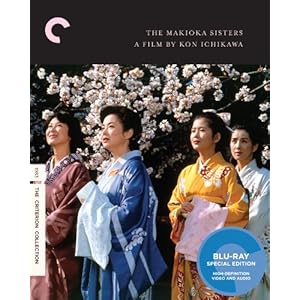

In 1949, Japanese writer Junichiro Tanizaki won the Imperial Prize for his novel Sasameyuki, known in America as The Makioka Sisters. Considered by many the greatest Japanese novel of the twentieth century, The Makioka Sisters is a family epic spanning the years 1938 to 1941, only months before the bombing of Pearl Harbor. By the end of Kon Ichikawa's 1983 film adaptation, one sister concludes, "Seasons change—but nothing really changes after all." Her statement is pointedly ironic given the events that surround it and the encroaching shadows of war, and yet she's not wrong: though times change, human nature doesn't.
Tanizaki knew seismic change, taking the occasion of the 1923 Tokyo earthquake to make a break with his first wife (their home was leveled: one couldn't ask for a more on the nose symbol). At the time, he moved to the Osaka area where he set The Makioka Sisters (novel and film deal with a threatened move in the other direction, from Osaka to Tokyo). The novel's original title translates roughly to "light snow," in evocation of the cherry blossoms the sisters annually observe together; Ichikawa begins his generally faithful adaptation with the sisters enjoying this tradition, one that is doomed not to last forever. Ichikawa had adapted Tanizaki before, specifically his diary-styled novel The Key (whereas Japanese novelist Kazuo Ishiguro tried and failed to crack a screenplay adaptation of Tanizaki's Diary of a Mad Old Man), so there's a certain confidence to Ichikawa's The Makioka Sisters despite its production challenges. For Ichikawa also understood well—and quite presently—life's terrible impermanence, having lost his wife and frequent screenwriting collaborator Natto Wada during prep for the film, which he scripted with Shinya Hidaka.
The Makioka Sisters tells of the four siblings of a prosperous Osaka family: Tsuruko (Keiko Kishi), Sachiko (Yoshiko Sakuma), Yukiko (Sayuri Yoshinaga), and Taeko (Yuko Kotegawa). Though their parents have passed on and their kimono business has been sold, the children have maintained the family prestige. Eldest Tsuruko, married to career-conscious banker Tasuo (Juzo Itami), holds down the austere Makioka main house, with a fussy, maternal concern for the rest of the family, while the next-in-line Sachiko plays "good cop" in the more lived-in "branch house." The branch house is literally more lived-in, as both younger sisters live there with Sachiko and her husband Teinosuke (Koji Ishizaka); the reflection of individuals and relationships through living spaces is a common Tanizaki theme (he would have liked Life as a House). Ichikawa turns subtext into text by making unmistakeable Teinosuke's longing for Yukiko, one of a few complications to the solidity of the family structure.
The primary action of novel and film revolves around several uncomfortable attempts at marital matchmmaking, mostly for Yukiko (though Yukiko doesn't insist upon it, Taeko is expected to wait for her immediate elder to be married first). The story amounts to the sisters' quest for happiness on their own terms: though the culture demands that marriage be of utmost concern, these are independent-minded women, and the elder sisters' husbands are yoshi, having adopted their wives' family name. The husbands' situation implicitly threatens their masculinity, which they tolerate but not always comfortably. It's just one of the many vicissitudes of life the characters face together, and the true test is always in how they will support each other or fail to do so when crises strike. Typically, the sisters show grace under pressure, even as their ability to laugh and enjoy life's beauty wavers with time and tide. Well acted by a strong ensemble, The Makioka Sisters quietly, steadily (and almost imperceptibly as it happens) endears us to these women, investing us in their varied fates.

|
|
 |
Criterion does a typically marvelous job of transfering film to hi-def video with its Blu-ray release of The Makioka Sisters. Grain is left intact and the image isn't artificially boosted, which means that Ichikawa's film looks like one from 1983: a good thing. Color is vibrant where it should be (mostly in the kimonos, which pop plenty), and black level is excellent. Detail and texture are similarly pleasing. The LPCM 1.0 track here won't win any awards, but it is entirely faithful, clean and clear, and appropriate to this presentation, with the original elements having gone Criterion's customary clean up to limit hiss and crackle.
Unfortunately, the only bonus feature is the film's "Trailer" (1:52, HD)—I would've loved if Tanizaki had gotten the Criterion treatment in a newly produced featurette about his oeuvre. Still, we get a nice, full-color sixteen-page booklet with credits, tech specs, and a fine essay by film scholar Audie Bock.
 |